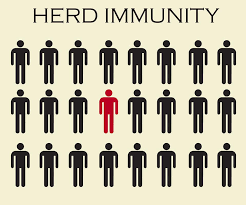Allysia Finley Follow – WSJ.com – Jan. 17, 2022
Forget about herd immunity. Covid-19 vaccines and prior infection don’t provide lasting protection against infection and transmission, especially with the Omicron variant. That makes it impossible for enough of the population to become immune to stop the virus from spreading.
But don’t despair. Omicron will give much of the population what some scientists call “superimmunity”—stronger protection against new variants and even future coronaviruses. Normal life will be possible even as the virus continues to spread and mutate. Superimmunity won’t necessarily stop people from being infected or transmitting the virus. But most people who get infected, even with a more virulent variant, will experience mild or no symptoms.
To understand why, consider how the immune system works. Two types of white blood cells, T- and B-cells, tag-team to vanquish invading pathogens. T-cells act as sentinels that circulate in the lymph nodes and bloodstream. When they spot an invader, they kick into action. One type of T-cell destroys infected cells. Another signals B-cells, the immune system’s force multipliers, to proliferate and secrete antibodies that neutralize the pathogen. Antibodies target proteins on the pathogen known as antigens.
Once the army of white blood cells and their antibody foot soldiers have defeated the virus, most die off. But some white blood cells that remember the pathogen persist and hone their combat skills. These so-called memory T-cells continue to reside in the bone marrow, lymph nodes and other tissues, ready to mobilize the immune system if they encounter the intruder again.
Meantime, memory B-cells go to boot camp in the lymph nodes, where they get into better fighting shape should the invader return. Memory B-cells train to produce antibodies that can block new variants. When and if the virus reappears, they can more rapidly reproduce and produce more-potent antibodies.
Vaccines emulate natural infection by training the immune system with a pseudo-virus or antigen—in the case of Covid-19, the spike on the surface of the virus that it uses to bind to human cells. Antibodies produced after vaccination tend to decline more rapidly than after infection, perhaps because the virus particles persist longer in the body than the vaccine-simulated antigens.
With both infection and vaccination, the immune system gets quicker, stronger and smarter after being exposed to a new challenge. Researchers have found that people who were infected by Covid-19 and later vaccinated crank out higher levels and a broader array of antibodies that last longer than do people who have only been vaccinated.
Similarly, a study last month by the Oregon Health and Science University found that vaccinated people who experienced breakthrough infections produced higher levels of antibodies that were up to 1,000% more effective than those generated two weeks after a second dose of the Pfizer vaccine. The researchers described this as superimmunity.
“I think this speaks to an eventual end game,” said co-author Marcel Curlin. “It doesn’t mean we’re at the end of the pandemic, but it points to where we’re likely to land: Once you’re vaccinated and then exposed to the virus, you’re probably going to be reasonably well-protected from future variants.” Dr. Curlin added: “Our study implies that the long-term outcome is going to be a tapering off of the severity of the worldwide epidemic.”
A study last month from South Africa found that people who were infected with Omicron produced antibodies that were more than four times better at neutralizing the Delta variant. Booster vaccines also improve the immune response by giving B-cells more time to mature—one reason antibodies after three Pfizer shots are capable in lab experiments of neutralizing Omicron while those after two aren’t.
But boosters train the immune system against the same target. Omicron’s myriad mutations create a bigger challenge for the B- and T-cells, and thereby strengthen the immune response. To use an analogy, if you train at doing push-ups, you’ll get stronger—but not as strong as if you also did pull-ups.
Infection also strengthens the T-cell response. T-cells from vaccinated people have been found to retain 70% to 80% of their efficacy against the Omicron variant spike protein. This has helped prevent more severe illness, even though vaccine antibodies are less effective against Omicron.
But infection trains T-cells to recognize virus proteins that also are less likely to mutate than the spike. Some of these proteins share similarities with the original SARS virus as well as four coronaviruses that can cause the common cold. SARS survivors have been found to have memory T-cells 17 years after infection that also recognized parts of the Covid-19 virus. A new study from the U.K.’s Imperial College found that people with pre-existing T-cells to non-spike proteins in common-cold coronaviruses were less likely to get infected with Covid-19.
All of this suggests that infection with Omicron is likely to stimulate potent and durable protection against Covid-19—and potentially other coronaviruses—even if it mutates to become more virulent. As Omicron rapidly spreads, people who have been vaccinated or previously infected will develop superimmunity. Covid-19 will become a virus that causes cold- and sometimes flulike symptoms—annoying but rarely deadly or disruptive.
One caveat is that older people generate weaker T-cell responses and memories to infections and vaccines. They’re likely to need annual booster shots. Omicron will end the pandemic by making Covid-19 endemic
To see this article and to subscribe to others like it, choose to read more.
 Listen Online
Listen Online Watch Online
Watch Online Find a Station in Your Area
Find a Station in Your Area








 Listen Now
Listen Now Watch Online
Watch Online
